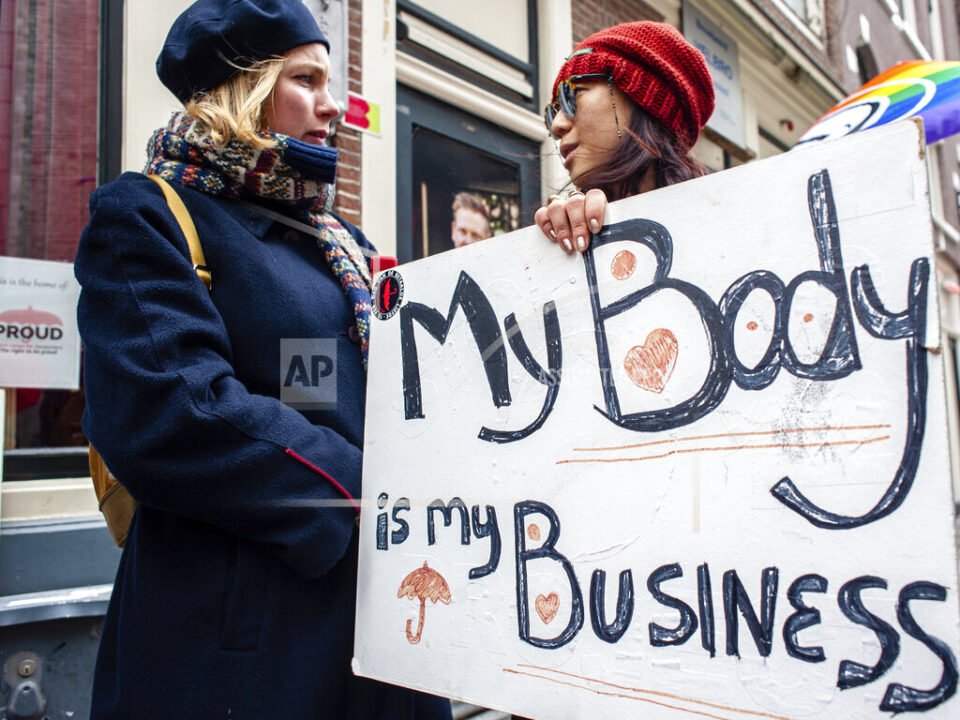Amsterdam is stepping up its efforts to rebrand its “go wild” and “no rules” image, overwhelmed by its own popularity. The red lights could soon be turned off at its city center brothels, drunken Britons are being advised to stay at home, and cannabis use is being restricted.

On April 1, new laws governing sex workers will go into effect, compelling Amsterdam’s sex work establishments to close their doors at three in the morning. as opposed to 6 a.m. to stop visitors to the red-light area from engaging in what the local authorities describe as nuisance conduct.
The shorter hours coincide with a proposal by the municipal council to relocate sex workers to a “erotic center” outside of the city core. Along with advocating for an aviation tax to address low-cost flights, Amsterdam is also introducing steps to restrict holiday rentals and ban river excursions.
According to a number of sex workers who spoke with CNN, the measures directed at them are raising stigma. They also said that they felt unfairly discriminated against and that they were being made the scapegoat for the city’s issues with mass tourism.

Asserting that “we now have to chose restriction instead of irresponsible growth,” a representative for Amsterdam’s deputy mayor, Sofyan Mbarki, told CNN that the package of restrictions is intended to make the city livable.
Income losses and safety worries
Felicia Anna, a former sex worker who has resided in Amsterdam for 13 years and who goes by the pseudonym Felicia Anna for privacy concerns, is the head of Red Light United, a union for window workers in the city’s red-light district.
According to Anna, the shortened hours would have a significant negative impact on window workers’ income, leaving many of them unable to pay for expenditures like window room rent and cabs to get home safely.
According to Anna, most employees begin their shifts at 12 or 1 o’clock in the morning, when the bars begin to close. You only have a few hours left—possibly two—to produce any money, which is insufficient.
Due to privacy concerns, Violet, a sex worker, uses a pseudonym. She also serves as the coordinator for the Prostitution Information Centre (PIC), an Amsterdam-based organization that disseminates knowledge about sex work.

The transgender community, according to Violet, will be especially impacted by the shortened hours because many customers arrive between three and one in the morning. to 6 a.m. make a request for transgender sex workers.
She also discussed welfare issues that could affect the capacity of all sex workers to return home securely.
In contrast to 6 a.m., which they claimed offers more social activity and transportation alternatives, Violet explained that if you’re traveling home at three in the morning, especially if everything is closed, then that leaves you, as a sex worker, in greater vulnerability.
Our income is mostly reliant on cash. Hence, we might be moving around with a lot of money at that hour of the morning. Since there aren’t many people on the streets, it allows those who want to hurt us a chance to do so, Violet remarked.
Red tape in the area that houses prostitution
The municipal council is also pushing to close window businesses and relocate sex workers to an erotic facility outside the city center, which is taking place in the background of the new reduced hours restriction.
On Thursday, the city council was discussing potential locations for the proposed erotic center when a protest led by sex workers was called to order.
Red Light Union reports that protesters presented Amsterdam Mayor Femke Halsema with a petition bearing the signatures of 266 sex workers. The petition demanded stronger police presence in the red-light district rather than earlier closing times and a relocation to an erotic center.
Halsema has argued that an erotic center will relieve strain on the red-light area and establish a space where sex workers can work safely and undisturbed, noting that some tourists view window workers as nothing more than a tourist attraction. Sex workers disagree, with Red Light Union claiming that the erotic center might foster a climate where criminality and “shady” behavior are more prevalent.
Working behind a window has the advantage of being visible, which makes you feel safer. Because you’re enclosed in a structure at an erotic center, you don’t get the same emotion,” Anna explained.
In addition to safety worries, Violet asserted that moving sex workers would also lose some social protections.
“If you relocate the red-light district, you’ll get more concentrated behaviors in a location that can’t be regulated as well and isn’t open to public scrutiny,” Violet added.
“One of the best things about working as a sex worker in Amsterdam is that when people try to take pictures with their cameras, it’s not just the sex workers who help,” Violet said, adding, “the Dutch aren’t ashamed to tell people off.”
Limitations on sex workers are just one of the points made in Amsterdam’s attempt to reinvent itself. Further restrictions, like lockout policies, limitations on the sale of alcohol, and a prohibition on smoking in public places, are also planned to be implemented in the red-light area.
The city council has also launched a number of campaigns, such as the “Stay Away” campaign, which initially targeted young British men by triggering a video advertisement warning of antisocial behavior if they search for terms like “stag party Amsterdam,” “cheap hotel Amsterdam,” or “pub crawl Amsterdam.”

A spokesperson for Amsterdam’s deputy mayor, Sofyan Mbarki, claimed that the campaign began in the UK because “part of this group is strongly represented in the nightlife in the city center, along with more than average nuisance behavior.” However, the spokesperson added that this is just the campaign’s first step and that “within the next months this campaign will also start in other EU countries and in the Netherlands itself.”
Felicia Anna and Violet claimed that, based on their own observations, British males act no differently than other tourists. They also remarked that locals are also engaging in bothersome conduct, in addition to tourists.
The wider issue, in Anna’s opinion, is the Amsterdam mentality of no regulations, which she feels needs to alter.
Anna maintained that despite numerous ads urging people to avoid the area, they would not adhere to her advice. “You must impart good manners to people. Nothing will ever change if you don’t do it.
Anna insisted, “This is not a zoo. “Go to the red light area, but act decently.”
Along with advocating for greater education, Violet expressed her concern that the campaign would backfire, claiming that “this targeting advertising makes it sound more like a vice city.”
Respect this location with the same respect you would your own city or homeland, Violet advised.




